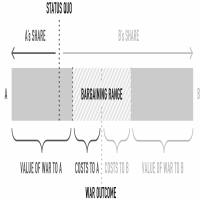Exam 4: Why Are There Wars
Exam 1: Introduction30 Questions
Exam 2: What Shaped Our World66 Questions
Exam 3: Understanding Interests, interactions, and Institutions75 Questions
Exam 4: Why Are There Wars71 Questions
Exam 5: Domestic Politics and War68 Questions
Exam 6: International Institutions and War67 Questions
Exam 7: Violence by Nonstate Actors: Civil War and Terrorism67 Questions
Exam 8: International Trade71 Questions
Exam 9: International Financial Relations68 Questions
Exam 10: International Monetary Relations68 Questions
Exam 11: Development: Causes of the Wealth and Poverty of Nations73 Questions
Exam 12: International Law and Norms64 Questions
Exam 13: Human Rights69 Questions
Exam 14: The Global Environment66 Questions
Exam 15: The Future of International Politics74 Questions
Exam 16: Foundations, war, and Peace96 Questions
Exam 17: International Political Economy, transnational Politics, and Looking Ahead86 Questions
Select questions type
Why is bargaining over future power especially difficult in international relations?
(Multiple Choice)
4.8/5  (40)
(40)
All of the following are reasons that it is difficult to know how likely an adversary is to go to war EXCEPT:
(Multiple Choice)
4.9/5  (39)
(39)
What is the difference between compellence and deterrence? Give an example of each (it can be from history or fictional)to illustrate the difference.
(Essay)
4.8/5  (31)
(31)
Which of the following territorial reasons is LEAST likely to lead to an interstate war?
(Multiple Choice)
4.8/5  (44)
(44)
Once the Soviet Union and the United States acquired large supplies of nuclear weapons,the chances of a direct military conflict between the two decreased.This is an example of which way that we can reduce the likelihood of war occurring?
(Multiple Choice)
4.9/5  (39)
(39)
A state's capabilities comprise all of the following EXCEPT:
(Multiple Choice)
4.9/5  (44)
(44)
In the figure,what do the words "Bargaining Range" represent? 
(Multiple Choice)
4.9/5  (34)
(34)
Why might an apparently indivisible good actually be divisible?
(Multiple Choice)
5.0/5  (39)
(39)
Why would a state go to war to change another state's regime?
(Multiple Choice)
4.8/5  (29)
(29)
Which of the following is an example of an indivisible good?
(Multiple Choice)
4.8/5  (45)
(45)
Which of the following is an example of extended deterrence?
(Multiple Choice)
4.8/5  (29)
(29)
Which country has the United States NOT tried to convince to abandon its weapons of mass destruction (WMD)programs in recent years?
(Multiple Choice)
4.8/5  (42)
(42)
Showing 21 - 40 of 71
Filters
- Essay(0)
- Multiple Choice(0)
- Short Answer(0)
- True False(0)
- Matching(0)